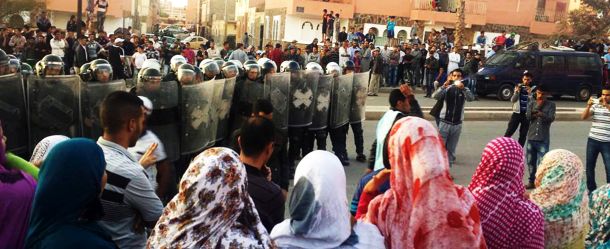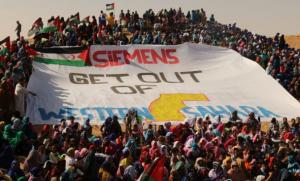
Nareva, the wind company of the King of Morocco, fails to answer questions on human rights by the international Business and Human Rights Center, in a study published yesterday.
The Business and Human Rights Center on 3 November published a new study on how 50 international renewable energy companies relate to Human Rights.
As usual, the green energy company of the king of Morocco, which wins all tenders in the occupied territory of Western Sahara, is totally impossible to reach.

WSRW has tried getting comments from Nareva in the past, on all email addresses that were possible to find, including addresses found on documents Nareva has sent to the UN Framework Convention on Climate Change. All mails bounce. The company does not have a website.
Nareva is an energy company owned by the Moroccan Palace via its holding company SNI. Nareva's 100% owned subsidiary EEM played a role in the building of the windmills in Western Sahara together with Siemens. It is also involved in the two large sites to be built in Western Sahara in partnership with Siemens and Enel over the coming years. Western Sahara Resource Watch on 2 November published a report about these programmes on occupied land.
Both Siemens Wind Power and Enel have indeed responded to the requests from Business and Human Rights. However, they have never responded to questions whether they have sought the consent of the people of Western Sahara to construct energy infrastructure in the territory.
Business and Human Rights asked the following question to the two companies: "What is your company’s process for obtaining and evaluating free, prior & informed consent?"
Enel answered shortly that "We do not have a structured process". Siemens Wind Power responded that "In this context, it is important to understand that Siemens Wind Power usually only offers the delivery, installation and commission of wind turbine generators. Siemens Wind Power normally does not by itself develop or own wind power projects, nor is it responsible for the balance of plants of a certain wind park projects".
The International Court of Justice has rejected Morocco's claims to Western Sahara, and stated that the Saharawi people have a right to self-determination. Over 100 UN Resolutions have called for the exercise of that right.
In 2015, the Committee on Economic, Social and Cultural Rights in the UN Human Rights Council, urged Morocco to respect the free, prior and informed consent of the people of the territory. All evidence suggests it is not doing so.
Report: Moroccan green energy used for plunder
At COP22, beware of what you read about Morocco’s renewable energy efforts. An increasing part of the projects take place in the occupied territory of Western Sahara and is used for mineral plunder, new WSRW report documents.
Energia verde per sostenere l'occupazione nel Sahara Occidentale
L'associazione Western Sahara Resource Watch ha pubblicato oggi stesso un rapporto che descrive come il Marocco intenda costruire impanti di energia rinnovabile di più di 1000 MW (megawatt) nel Sahara Occidentale, un territorio che il Marocco occupa parzialmente.
Green energy to uphold occupation in Western Sahara
Western Sahara Resource Watch has today launched a report detailing how Morocco intends to build over 1000 MW (megawatts) of renewable energy plants in Western Sahara, a territory that Morocco partially occupies.
Siemens and Enel to construct wind farms on occupied land
Danish-German Siemens Wind Power and Italian Enel Green Power have won the tender to construct five wind farms in Morocco. Only, two of planned farms are located outside of Morocco, and inside occupied Western Sahara. WSRW had warned them from taking part in the tender.


